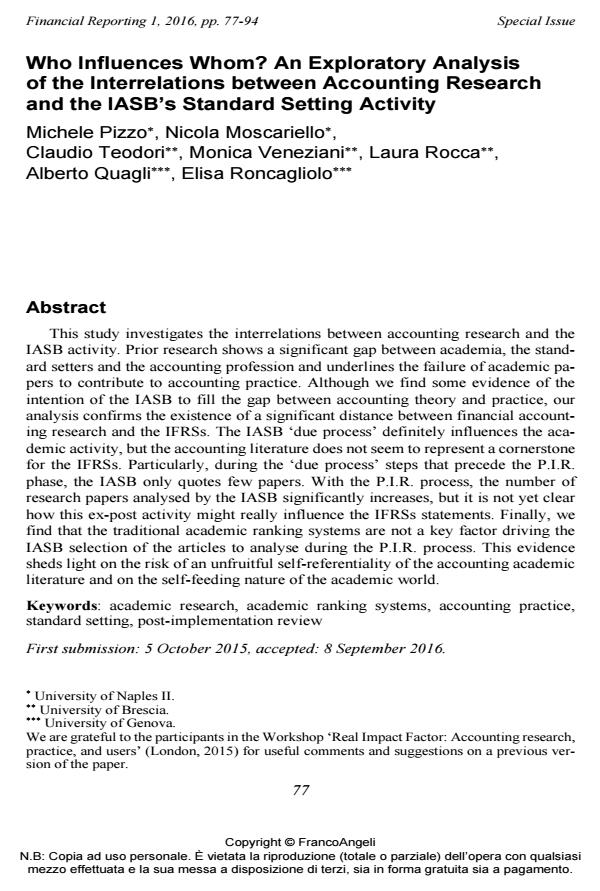Who Influences Whom? An Exploratory Analysis of the Interrelations between Accounting Research and the IASB’s Standard Setting Activity
Titolo Rivista FINANCIAL REPORTING
Autori/Curatori Michele Pizzo, Nicola Moscariello, Claudio Teodori, Monica Veneziani, Laura Rocca, Alberto Quagli, Elisa Roncagliolo
Anno di pubblicazione 2016 Fascicolo 2016/1
Lingua Inglese Numero pagine 18 P. 77-94 Dimensione file 250 KB
DOI 10.3280/FR2016-001005
Il DOI è il codice a barre della proprietà intellettuale: per saperne di più
clicca qui
Qui sotto puoi vedere in anteprima la prima pagina di questo articolo.
Se questo articolo ti interessa, lo puoi acquistare (e scaricare in formato pdf) seguendo le facili indicazioni per acquistare il download credit. Acquista Download Credits per scaricare questo Articolo in formato PDF

FrancoAngeli è membro della Publishers International Linking Association, Inc (PILA), associazione indipendente e non profit per facilitare (attraverso i servizi tecnologici implementati da CrossRef.org) l’accesso degli studiosi ai contenuti digitali nelle pubblicazioni professionali e scientifiche.
This study investigates the interrelations between accounting research and the IASB activity. Prior research shows a significant gap between academia, the standard setters and the accounting profession and underlines the failure of academic papers to contribute to accounting practice. Although we find some evidence of the intention of the IASB to fill the gap between accounting theory and practice, our analysis confirms the existence of a significant distance between financial accounting research and the IFRSs. The IASB ‘due process’ definitely influences the academic activity, but the accounting literature does not seem to represent a cornerstone for the IFRSs. Particularly, during the ‘due process’ steps that precede the P.I.R. phase, the IASB only quotes few papers. With the P.I.R. process, the number of research papers analysed by the IASB significantly increases, but it is not yet clear how this ex-post activity might really influence the IFRSs statements. Finally, we find that the traditional academic ranking systems are not a key factor driving the IASB selection of the articles to analyse during the P.I.R. process. This evidence sheds light on the risk of an unfruitful self-referentiality of the accounting academic literature and on the self-feeding nature of the academic world.
Parole chiave:Academic research, academic ranking systems, accounting practice, standard setting, post-implementation review
- The assurance of non-financial disclosure: A longitudinal analysis of the academic and professional literature Michele Guidi, Marco Giuliani, Maria Serena Chiucchi, Stefano Marasca, in FINANCIAL REPORTING 2/2021 pp.5
DOI: 10.3280/FR2021-002001
Michele Pizzo, Nicola Moscariello, Claudio Teodori, Monica Veneziani, Laura Rocca, Alberto Quagli, Elisa Roncagliolo, Who Influences Whom? An Exploratory Analysis of the Interrelations between Accounting Research and the IASB’s Standard Setting Activity in "FINANCIAL REPORTING" 1/2016, pp 77-94, DOI: 10.3280/FR2016-001005